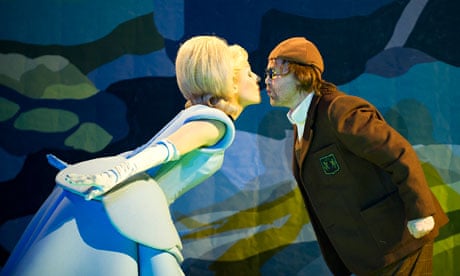The excesses of opera, in which the inconceivable becomes the norm and reality surrenders to pipe-dream delirium, find ultimate display in Offenbach's The Tales of Hoffmann. The work's oddness – three episodes in the disastrous love life of a poet whose passions include a mechanical doll – is strange rather than funny, bizarre rather than tragic; wretched, unsettling and never reassuring. Surrealism may not have existed by the time of the work's incomplete premiere in 1881, but Offenbach and his inspiration, the writer ETA Hoffmann, were at their zany endeavours years before anyone solemnised such behaviour into an "ism".
Accordingly Richard Jones, director, and Giles Cadle, designer, have marched triumphantly into the landscape of Ernst, Magritte and Dalí in their new production for English National Opera, with delicious, sparky costumes by Buki Shiff and subtle, ingenious lighting by Mimi Jordan Sherin. There's an exciting newcomer and ENO debutante, the American soprano Georgia Jarman, who sings all three heroine roles: a marathon which appeared to make no visible or audible demands on her bright, versatile tone and fragile but sinewy physical presence. And a British talent shows fresh skills and breadth: the tenor Barry Banks, who shines from beneath his shaggy, I'm-a-dissolute-poet wig and beard.
Jones's own natural habitat, a garish upside-down world touched by melancholy suburbia and picture-book sylvan beauty, has always offered grazing space for surrealism's favourite pets: monster gorillas and mustachioed circus trainers, fag-in-mouth sluts, monocled women and crowds wearing animal heads. When the opera in question is, say, Verdi's Macbeth or Falstaff – recent Jones successes at Glyndebourne – the leap of imagination is more wildly contorted than with Prokofiev (The Gambler at ROH) or now The Tales of Hoffmann, where the match is tailor-made.
The edition, by Michael Kaye and Jean-Christophe Keck, is new. It trims, adds and switches around the pieces of this impossible collage. Instead of ending with the consumptive Antonia, who dies from singing, the opera concludes with the story of Giulietta, whose tale opens with the famous Barcarolle. It makes no better or worse sense than the version familiar from Covent Garden's vintage John Schlesinger staging. A bonus is that Nicklausse, Hoffmann's ambiguous muse, has more action. Since he is sung by Christine Rice, in excellent form as a Richmal Crompton schoolboy, no one should complain.
Despite the strengths of all these singers, together with Clive Bayley, masterly in the multiple villain roles, there was some musical unevenness. The ENO chorus had ensemble and tuning problems early on, and lacked their usual reliably well-shaded tone. The orchestra, conducted by Antony Walker, had some difference of opinion with the singers at times, but these were doubtless merely first-night fluffs.
All takes place in a claustrophobic top-floor room dingy but for the big skylight, and with a gramophone horn out of which, in a brilliant touch, Antonia's mother (Catherine Young) sings. The Olympia doll scene had a judicious mix of mechanical wizardry and humanity, with the creature herself spotless in powder blue and the servant Cochenille wittily delivered by a gaudily cross-dressed Simon Butteriss. By the time Giulietta the whore arrived, delayed by a technical hitch, some of us were feeling sated – this is already a long evening – but matters will improve without that handicap. Maybe it's time to revive the 1951 Shepperton-made film version, conducted by Thomas Beecham and directed by Powell and Pressburger. I've never seen it but Cecil B DeMille was a fan and it's all over in 127 minutes.
In diametric opposition, the only place to go last week was Croydon. Surrey Opera mounted the world-premiere staging of Thelma, a rediscovered opera by Samuel Coleridge-Taylor (1875-1912). I do not trust myself to give a precis of the plot. Here are some key elements: Vikings, pagans, Christians, an elfin guardian, an amulet, a whirlpool's vortex, a pinch of snuff, sea sprites, an underwater kingdom, a fatal thrust. It seems, unaccountably, Coleridge-Taylor was coy about having written the libretto himself.
Naturally there is a love triangle, and were it all sung in Norse or Bulgarian rather than English we might mind rather less that the text is somewhat crackpot and mildly turgid, despite the rigorous editorial efforts of Stephen Anthony Brown and director Christopher Cowell. Bursting with ear-catching melody and ripe orchestral colour, the score was well worth hearing, with fine contributions from the talented cast who gave their all, as did conductor Jonathan Butcher. The simple helmets-and-tabards production, too, had a touching authenticity.
Coleridge-Taylor, the "Black Mahler", as Charles Elford's new biography terms him, is being celebrated this centenary year. Check him out. Born to an English mother and African father, he grew up streets away from the Salvation Army's Croydon Citadel, whose band (still active) was formed in 1883 and whose bandmaster was arrested in the early days for disturbing the peace. That rousing brass-band verve informs the opera's score. Thelma is not a masterpiece but it offers a snapshot of a strand of British musical history steeped not only in Wagner or Elgar but in black American music and Croydon street life too. Ideas repeat rather than develop, but there is no shortage of action, especially in the dramatic final act. All praise to Surrey Opera.
A few brief but heartfelt words on the Nash Ensemble's sublime string sextets concert at LSO St Luke's (Strauss and Brahms, broadcast on Radio 3 on 29 February, 1pm): I was poised to remark on the seraphic cello-playing of Paul Watkins, who turns even an off-beat pizzicato into a thing of joy. Then days later it emerged that Watkins will join the Emerson Quartet, replacing David Finckel when he departs after 34 impressive years. Watkins, one of the UK's finest musicians, will change the character of this august, gleaming American group. I'm agog to see how. In the rarefied but exhilarating world of chamber music this news is as big as it gets.

Comments (…)
Sign in or create your Guardian account to join the discussion